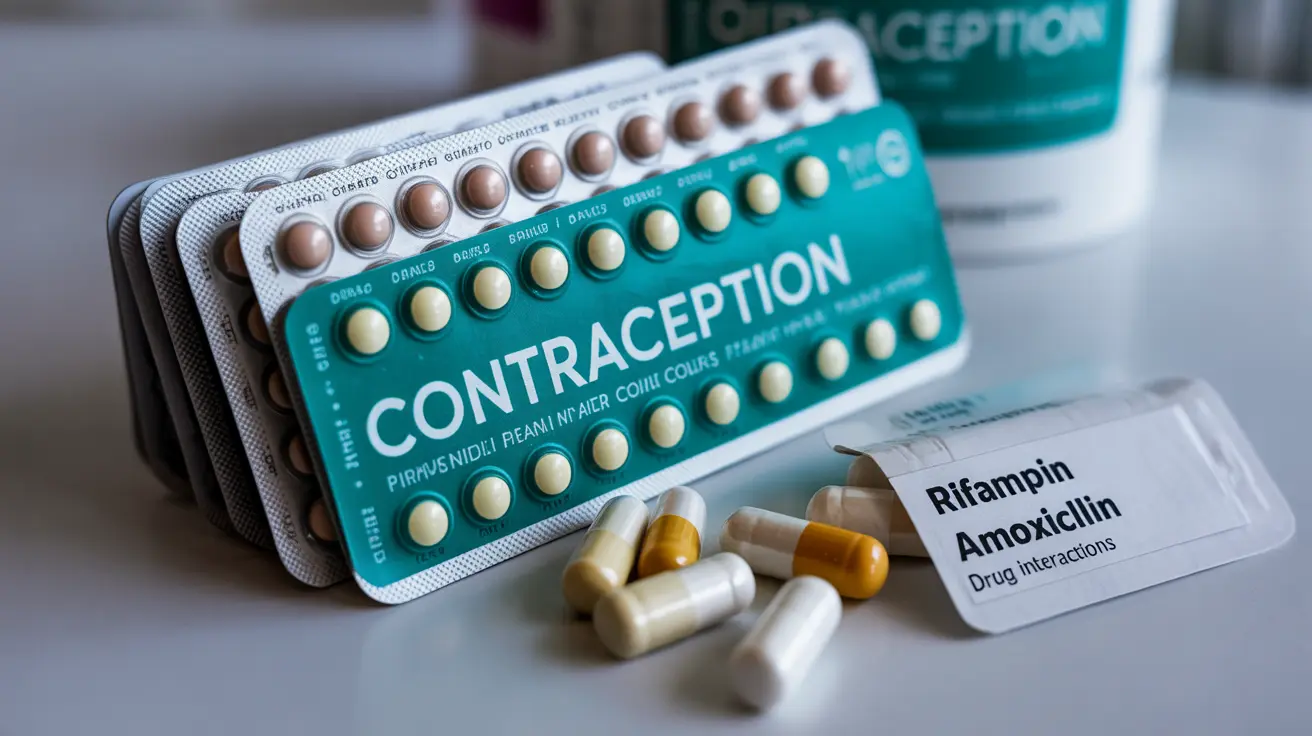Understanding the interaction between antibiotics and birth control pills is crucial for anyone who relies on hormonal contraception. While most antibiotics don't interfere with birth control effectiveness, certain medications can reduce the protective benefits of your contraceptive pills, potentially leading to unintended pregnancy.
This comprehensive guide explores which antibiotics affect birth control pills, helping you make informed decisions about your reproductive health while managing medical treatments that require antibiotic therapy.
Understanding How Birth Control Pills Work
Birth control pills contain synthetic hormones—typically estrogen and progestin—that prevent pregnancy through multiple mechanisms. These hormones suppress ovulation, thicken cervical mucus to block sperm, and thin the uterine lining to prevent implantation.
The effectiveness of these hormonal contraceptives depends on maintaining consistent hormone levels in your bloodstream. When certain medications interfere with how your body processes these hormones, the contraceptive protection can be compromised.
Antibiotics That Reduce Birth Control Effectiveness
Rifampin and Related Medications
Rifampin stands out as the primary antibiotic known to significantly reduce birth control pill effectiveness. This medication, commonly used to treat tuberculosis and certain bacterial infections, induces liver enzymes that accelerate the breakdown of contraceptive hormones.
Other rifamycin antibiotics that can affect birth control include:
- Rifabutin (used for mycobacterial infections)
- Rifapentine (tuberculosis treatment)
These medications can reduce estrogen and progestin levels by up to 50%, substantially compromising contraceptive protection.
Griseofulvin
While technically an antifungal rather than a traditional antibiotic, griseofulvin is another medication that can reduce birth control effectiveness. It's primarily used to treat fungal infections of the skin, hair, and nails, and works through similar enzyme-inducing mechanisms as rifampin.
Commonly Prescribed Antibiotics That Don't Affect Birth Control
The vast majority of antibiotics prescribed for common infections do not interfere with birth control pills. Extensive research has shown that the following frequently used antibiotics maintain full contraceptive effectiveness:
- Amoxicillin and amoxicillin-clavulanate
- Azithromycin (Z-pack)
- Ciprofloxacin and other fluoroquinolones
- Doxycycline and other tetracyclines
- Cephalexin and other cephalosporins
- Clindamycin
- Erythromycin and other macrolides
These antibiotics work through different mechanisms and don't significantly alter hormone metabolism, allowing your birth control to maintain its protective effects.
The Science Behind Antibiotic-Birth Control Interactions
The interaction between certain antibiotics and birth control pills occurs primarily through enzyme induction in the liver. Rifampin and related medications activate cytochrome P450 enzymes, specifically CYP3A4, which breaks down contraceptive hormones more rapidly than normal.
This accelerated metabolism reduces the amount of active hormones available in your bloodstream, potentially allowing ovulation to occur and reducing the contraceptive's other protective mechanisms.
Other Medications That May Interfere With Birth Control
Beyond antibiotics, several other medication categories can reduce birth control effectiveness:
- Anti-seizure medications (phenytoin, carbamazepine, topiramate)
- HIV protease inhibitors
- St. John's wort (herbal supplement)
- Some antiretroviral drugs
- Certain mood stabilizers
Always inform your healthcare provider about all medications and supplements you're taking to assess potential interactions with your birth control method.
Managing Birth Control During Antibiotic Treatment
When Taking Rifampin or Other Interfering Antibiotics
If you need treatment with rifampin or another antibiotic that affects birth control, your healthcare provider will likely recommend additional contraceptive measures. These may include:
- Using barrier methods like condoms during treatment and for one month after
- Considering a copper IUD as temporary or permanent alternative
- Discussing higher-dose contraceptive formulations
- Exploring non-hormonal birth control options
Duration of Precautions
The effects of enzyme-inducing antibiotics can persist beyond the treatment period. Most healthcare providers recommend using backup contraception for at least one full menstrual cycle after completing rifampin or similar medications to ensure hormone levels have normalized.
Making Informed Decisions About Your Health
Communication with your healthcare provider is essential when managing both infection treatment and contraceptive needs. Don't hesitate to discuss concerns about medication interactions, and always inform all your healthcare providers about your birth control method and any medications you're currently taking.
Remember that stopping birth control suddenly isn't recommended, even when taking interfering medications. Instead, use additional protective measures while maintaining your regular contraceptive routine unless specifically advised otherwise by your healthcare provider.
Frequently Asked Questions
Which antibiotics can make birth control pills less effective?
Only a few antibiotics can reduce birth control effectiveness. Rifampin is the primary antibiotic known to significantly interfere with contraceptive hormones, along with related medications like rifabutin and rifapentine. The antifungal medication griseofulvin can also reduce birth control effectiveness. The vast majority of commonly prescribed antibiotics do not affect birth control pills.
Do common antibiotics like amoxicillin or azithromycin affect birth control?
No, common antibiotics like amoxicillin and azithromycin do not affect birth control effectiveness. Extensive research has confirmed that these frequently prescribed antibiotics, along with others like ciprofloxacin, doxycycline, and cephalexin, do not interfere with contraceptive hormones. You can safely take these medications while maintaining full birth control protection.
What should I do if I need to take rifampin while using birth control pills?
If you need rifampin treatment, use additional contraceptive methods like condoms during treatment and for one month afterward. Discuss alternative birth control options with your healthcare provider, such as a copper IUD or higher-dose hormonal formulations. Don't stop taking your birth control pills suddenly—continue your regular routine while adding backup protection methods.
Are there any other medications besides antibiotics that interfere with birth control?
Yes, several other medications can reduce birth control effectiveness, including anti-seizure drugs like phenytoin and carbamazepine, some HIV medications, St. John's wort herbal supplement, certain antiretroviral drugs, and some mood stabilizers. Always inform your healthcare provider about all medications and supplements you're taking to identify potential interactions.
How can I prevent pregnancy when taking antibiotics that affect birth control?
Use barrier methods like condoms consistently during treatment with interfering antibiotics and continue backup protection for one full menstrual cycle after completing the medication. Consider discussing alternative contraceptive methods with your healthcare provider, such as a copper IUD or injectable contraceptives. Maintain open communication with your healthcare team about your contraceptive needs throughout treatment.




